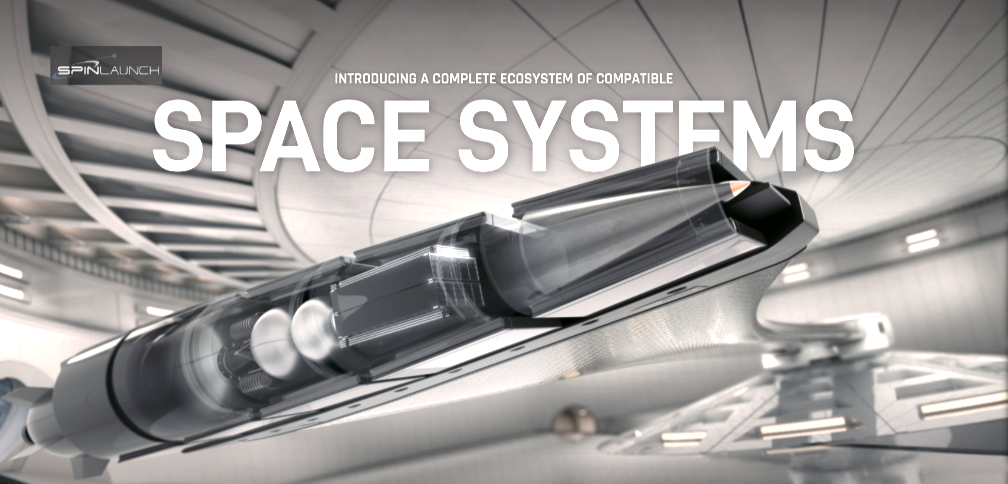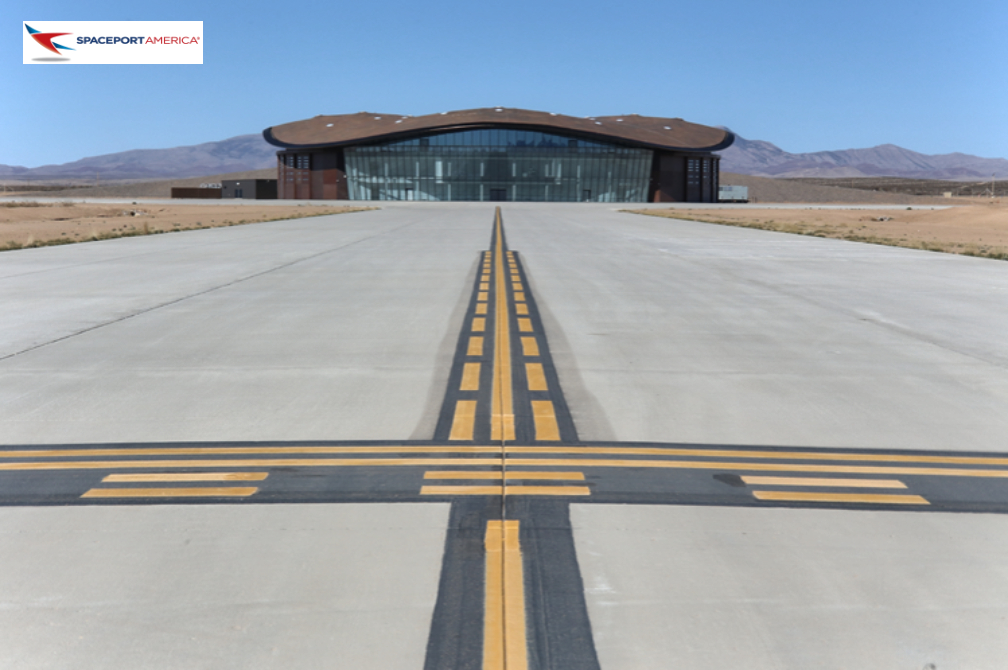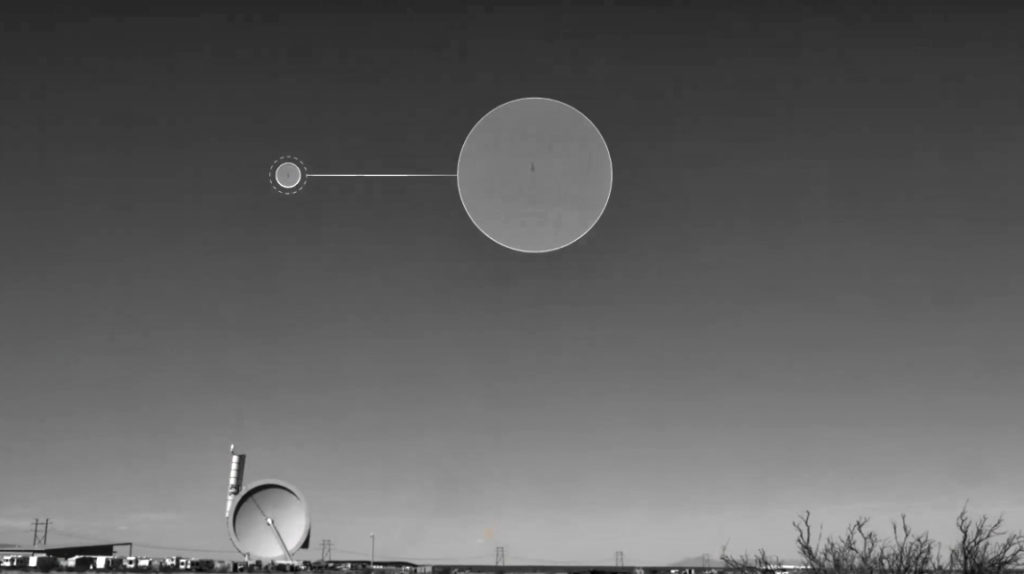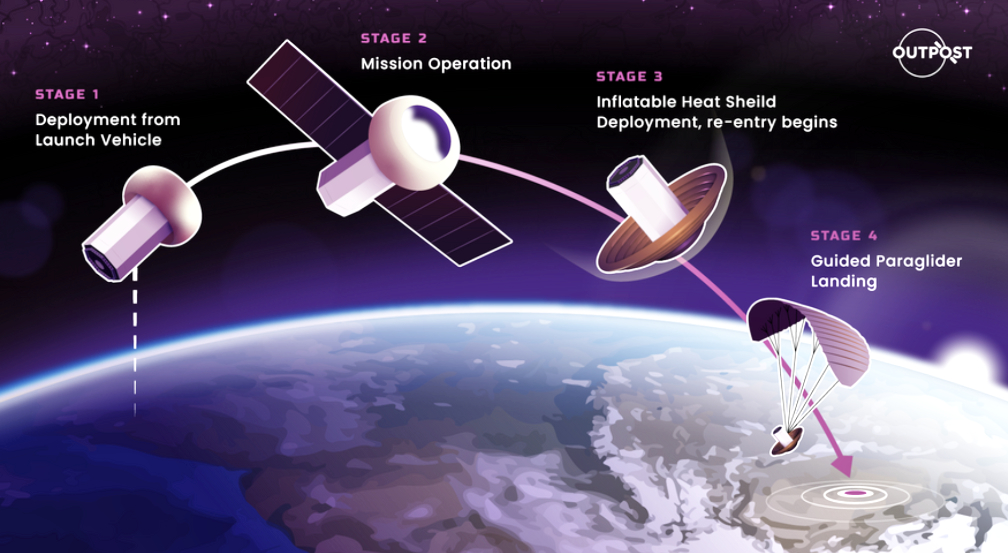
SpinLaunch has announced the results of their tenth successful Flight Test of its Suborbital Accelerator from Spaceport America, New Mexico. The flight test, which occurred on September 27, 2022, demonstrated that SpinLaunch partners’ standard satellite components are inherently compatible with SpinLaunch’s launch environment, and provided critical flight data, as all payloads were flown and recovered successfully.

Flight Test 10, which had a similar flight trajectory as previous campaigns, was witnessed by more than 150 partners, government officials, and industry advocates. This was the company’s tenth flight test in just under 11 months since the Suborbital Mass Accelerator came online in late 2021.

Test Flight Payloads
Four partner payloads, as well as two instrumentation payloads, were flown on the Suborbital Accelerator Flight Test Vehicle. For partners, the flight test provided critical data on the launch environment and payload integration process. As part of the pre-flight qualification process, SpinLaunch accelerated payloads up to 10,000G in SpinLaunch’s 12-meter Lab Accelerator at its Long Beach headquarters. Payloads were inspected post-spin and subsequently integrated into the Flight Test Vehicle in preparation for Flight Test 10.


NASA Captures Insights and Data from SpinLaunch’s Payload Integration Process, Testing & Launch Environment
Earlier this year, SpinLaunch signed a Space Act Agreement with NASA to develop, integrate and fly a NASA payload, providing the agency with the information necessary to determine the potential of future commercial launch opportunities with SpinLaunch. Two key goals were at the heart of the agreement: to better understand SpinLaunch’s payload integration and testing procedures, and gain insight into the mass accelerator launch environment.
To fulfill this objective, NASA provided a Data Acquisition Unit (DAQ) to capture critical launch characteristics of SpinLaunch’s kinetic launch system. The sensor suite was equipped with two accelerometers in addition to a gyroscope, magnetometer, and sensors for pressure, temperature, and humidity.
Prior to handoff, NASA performed their own thermal and acceleration tests to validate the DAQ would capture the desired launch environment data. After the NASA qualification tests, SpinLaunch conducted high-g acceleration testing on the DAQ and confirmed function of the hardware in advance of the Suborbital Accelerator Flight Test.
After the completion of Flight Test 10, the DAQ was successfully recovered and removed from the Flight Test Vehicle. SpinLaunch test engineers retrieved the data and reviewed it with NASA personnel from their Flight Opportunities program, who were onsite to observe the Flight Test in person.
Satellite Partners Learn Valuable Information about SpinLaunch’s Mass Accelerator Launch Environment
Airbus U.S. Space & Defense, Inc. is a leading provider of satellite systems. For Flight Test 10, Airbus U.S. provided their satellite sun sensor, which is typically used for spacecraft attitude control and positioning purposes.
The sun sensor was tested at 10,000G in SpinLaunch’s 12-meter Lab Accelerator prior to integrating it with the flight test vehicle. Successful testing to 10,000G was the first step in qualifying subsystems for use on SpinLaunch’s orbital launch system. Following both the high-g centrifuge pre-launch testing and Flight Test 10, the sun sensor’s output signal was compared to the preflight data. This comparison testing verified that the performance and operation of the sun sensor was not affected by the loads during the pre-flight, flight, or recovery phases. Together, SpinLaunch and Airbus U.S. plan to work together to qualify a variety of Airbus U.S. satellite systems that are compatible with the SpinLaunch orbital centrifuge and flight environment.
Cornell Engineering’s Space Systems Design Studio (SSDS) has developed and launched small, inexpensive satellites called ChipSats to provide distributed in-situ measurements of the upper atmosphere of multiple planets, including Earth. Flight Test 10 exercised the operation of a SpinLaunch designed payload deployment system, which released multiple ChipSats from the Flight Test Vehicle. The payload deployment system is a key value SpinLaunch can provide Suborbital Launch customers and partners. Future SpinLaunch tests with SSDS may include high altitude ChipSat dispersion to verify the accuracy of SSDS’s ChipSat reentry and atmospheric trajectory simulations.

Outpost, a company developing reusable satellites for high-precision Earth return, provided SpinLaunch with an onboard computer for testing and qualification in the SpinLaunch launch environment. A preflight test was performed in the SpinLaunch Lab Accelerator to qualify the unit for the Flight Test.

After a successful flight and recovery of the payload, a final functional test was performed, validating the flight computer is compatible with SpinLaunch’s launch environment. The flight test represents the first step towards the broader qualification of Outpost components and structures for SpinLaunch’s orbital centrifuge and launch environment. SpinLaunch and Outpost plan to continue their ongoing collaboration as both organizations seek to provide lower cost, more sustainable access to space.

“Flight Test 10 represents a key inflection point for SpinLaunch, as we’ve opened the Suborbital Accelerator system externally for our customers, strategic partners, and research groups,” said Jonathan Yaney, Founder & CEO of SpinLaunch. “The data and insights collected from flight tests will be invaluable for both SpinLaunch, as we further the development of the Orbital Launch system, and for our customers who are looking to us to provide them with low-cost, high-cadence, sustainable access to space.”
“Our Airbus U.S. engineering team is excited to work with SpinLaunch in support of this significant advancement of a new accelerated launch concept,” said Airbus U.S. CTO, Armen Askijian. “We look forward to continued collaboration and future success.”
“Centimeter-scale spacecraft will be a critical tool in future planetary science missions,” said Hunter Adams, a lecturer in Cornell Engineering’s school of electrical and computer engineering. “Deployed en masse from orbit, ChipSats will descend through the atmosphere and down to the surface of this planet and others, gathering spatially distributed datasets as they fall. To plan these missions, we must understand the chaotic trajectories that low-mass and high-surface area objects take from the top of the atmosphere to the surface of the planet. By conducting experiments with SpinLaunch’s Suborbital Accelerator, we can gather critical information for planning future planetary science missions involving ChipSats. It is absolutely a game-changer for centimeter-scale spacecraft research.”
“Outpost and SpinLaunch share the same mission of providing customers with low-cost, rapid launch – which means rethinking the way we access space,” said Michael Vergalla, co-founder and CTO at Outpost. “Testing our hardware with SpinLaunch’s mass accelerator gives us options and provides valuable engineering data for developing our hardware to be compatible with their launch system and unlock the upside of low-cost and high-cadence launch.”
SpinLaunch was founded by Jonathan Yaney, in 2014, to reimagine space launch technology and enable sustainable and easy access to space. The company is building a ground-based, kinetic launch system that delivers a substantially less expensive and environmentally sustainable system to place constellations of small satellites into Low Earth Orbit (LEO). SpinLaunch is based in Long Beach, California, and has built its Suborbital Mass Accelerator at Spaceport America in New Mexico. The company is on target to place satellites into orbit and deliver payloads for spacefaring endeavors by 2026. SpinLaunch is supported by partners, including ATW Partners, Kleiner Perkins, GV, Airbus Ventures. In 2022, SpinLaunch was named as one of the most innovative companies by TIME Magazine.
